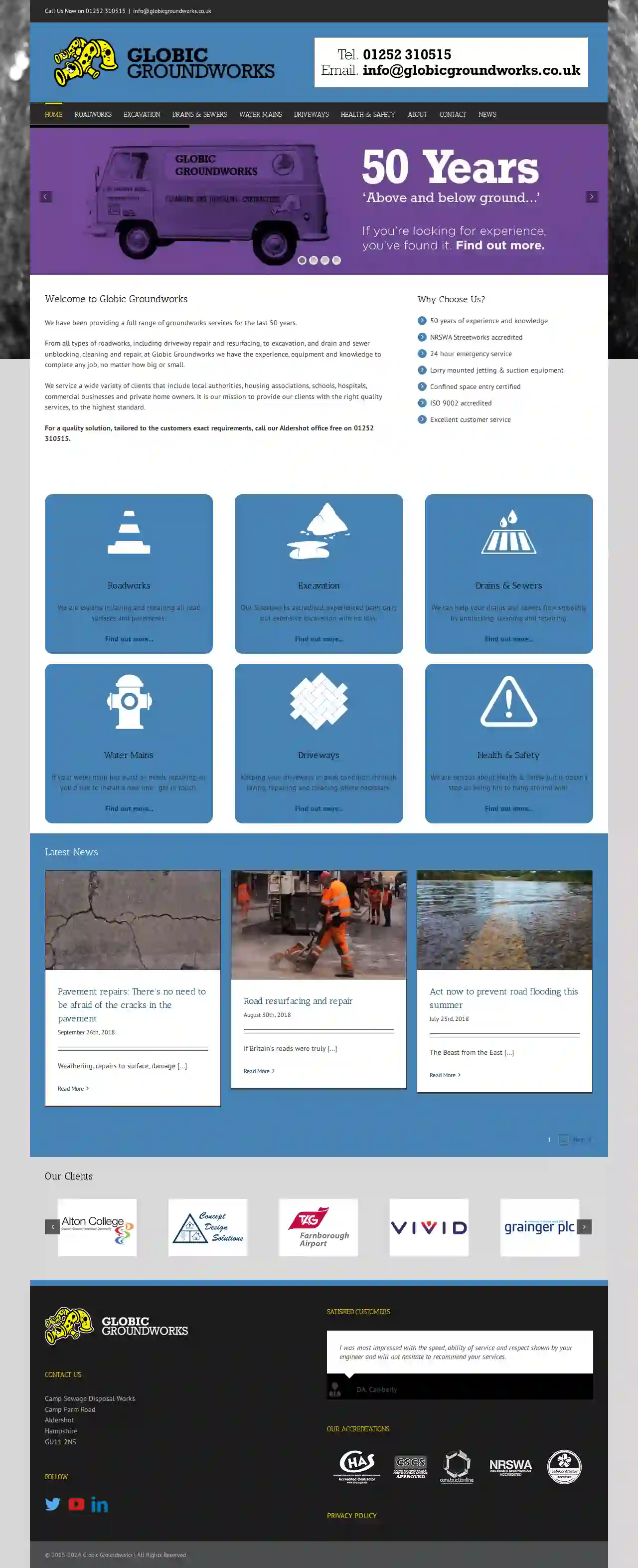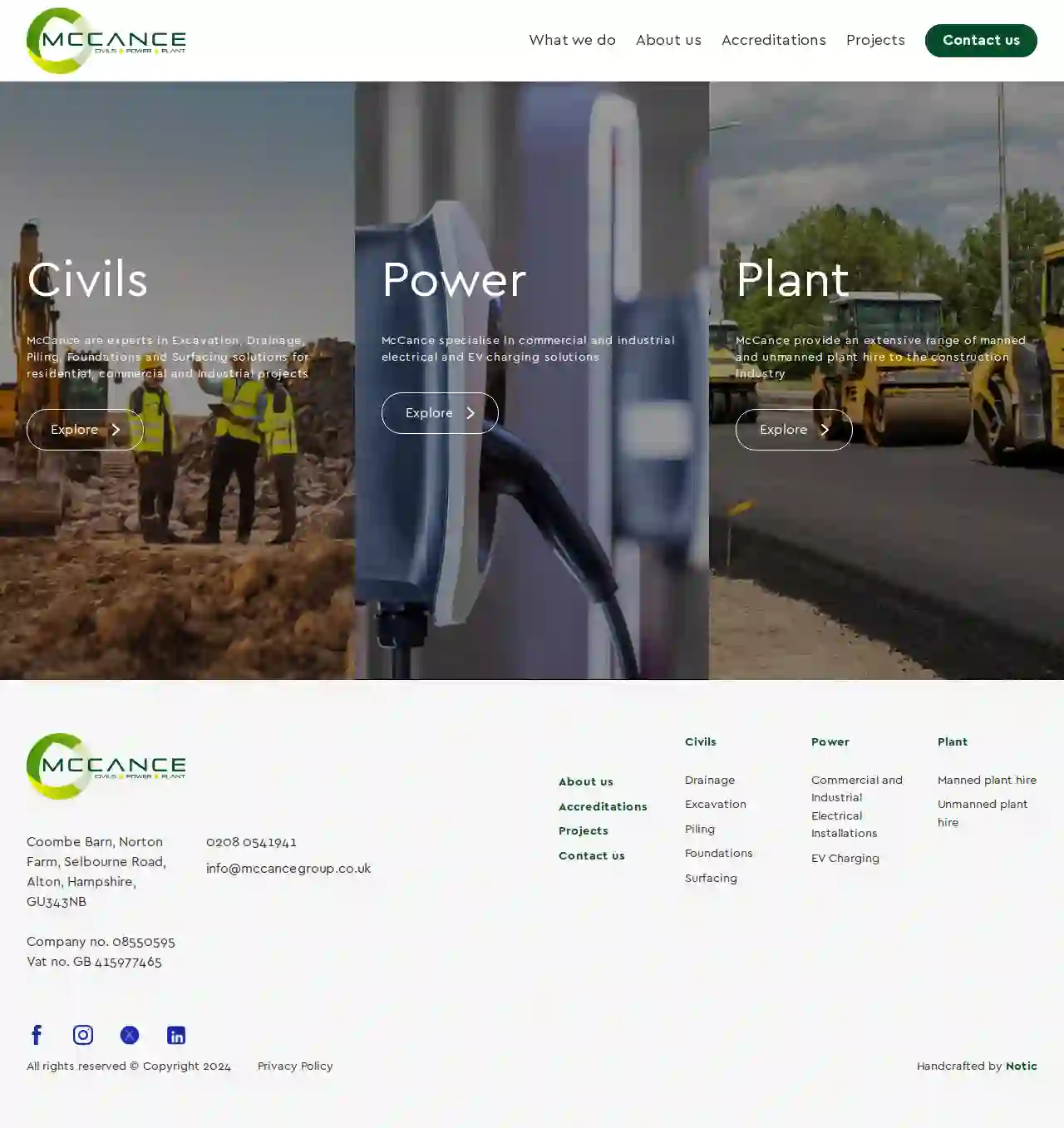Excavation Contractors Eastleigh
Top 10 Excavating Contractor in Eastleigh
Get up to 3 Land Excavation quotes for your project today! Compare profiles, reviews, accreditations, portfolio, etc... and choose the best offer.
- Ea
Earth Works Plant Ltd
51 reviewsGosport, GB- Services
- Why Us?
Get Quote - Po
Portsmouth Water
3.948 reviewsHavant, GB- Services
- Why Us?
Get Quote 
Globic Groundworks
1Camp Sewage Disposal Works, Camp Farm Road, Aldershot, GU11 2NS, GBWelcome to Globic Groundworks Globic Groundworks has been providing a comprehensive range of groundworks services for the past 50 years. From all types of roadworks, including driveway repair and resurfacing, to excavation, and drain and sewer unblocking, cleaning and repair, Globic Groundworks possesses the experience, equipment, and expertise to tackle any project, regardless of size. We cater to a diverse clientele, including local authorities, housing associations, schools, hospitals, commercial businesses, and private homeowners. Our unwavering commitment is to deliver high-quality services that meet the highest standards, exceeding our clients' expectations. For a tailored solution that precisely aligns with your specific requirements, contact our Aldershot office toll-free at 01252 310515.
- Services
- Why Us?
- Accreditations
- Testimonials
- Gallery
Get Quote
Gosport Plant & Tool Hire
525 reviewsUnit 6 Cranbourne Road, Gosport, Hants., PO12 1RL, GBWelcome To Gosport Tool Hire Gosport Plant and Tool Hire is a family owned and run business, servicing a growing demand from DIY’ers and professional construction workers in Gosport, Fareham, Stubbington, Lee on Solent and surrounding areas. It has been established to provide access to the high quality, fairly priced tools needed by customers who currently have to travel further afield to find a reliable option. OX Tools Outlet Gosport Plant & Tool Hire also has a retail arm in the form of ‘OX TOOLS’ which provides all necessary accessories for their Hired Tools. eg. from cutters, discs, drill sets, sandpaper etc and a comprehensive range of small tools eg. spirit levels, tape measures, trowels etc. that the average ‘DIY’er (or builder) may require in the course of their project.
- Services
- Why Us?
- Gallery
Get Quote- Th
The Viersma Companies
51 reviewsAndover, GB- Services
- Why Us?
Get Quote - Fr
Frensham Landscaping
4.85 reviewsAldershot, GB- Services
- Why Us?
Get Quote 
McCance Group
1Coombe Barn, Norton Farm, Selbourne Road, Alton, Hampshire, GU343NB, GBMcCance Group: Your Trusted Partner for Construction and Infrastructure Solutions McCance Group is a leading provider of construction and infrastructure solutions, specializing in a wide range of services including civils, drainage, excavation, piling, foundations, surfacing, power, and plant hire. We are committed to delivering high-quality, reliable, and cost-effective solutions to meet the needs of our clients. Our team of experienced professionals is dedicated to providing exceptional service and exceeding client expectations. We are committed to safety, quality, and environmental responsibility in all our operations. Whether you are a residential, commercial, or industrial client, McCance Group has the expertise and resources to handle your project from start to finish. We are proud to have a strong track record of successful projects, and we are committed to building long-term relationships with our clients. Contact us today to discuss your project needs and learn how McCance Group can help you achieve your goals.
- Services
- Why Us?
- Gallery
Get Quote- Cl
Clee Hill Plant Ltd
52 reviewsAndover, GB- Services
- Why Us?
Get Quote - Sc
Schofield Groundworks Ltd
32 reviewsHavant, GB- Services
- Why Us?
Get Quote - Sk
Skips in Havant
1Havant, GB- Services
- Why Us?
Get Quote
Over 11,537+ Excavation Pros on our platform
Our excavation contractors operate in Eastleigh & surrounding areas!
ExcavationHQ has curated and vetted the Best Excavation Contractors in and around Eastleigh. Find a top & reliable business today.
Frequently Asked Questions About Excavation Contractors
- Clearly Define the Scope: Outline the project's goals, including the excavation area, depth, grade, and intended use.
- Obtain Necessary Permits: Research and acquire any required permits from your local authorities.
- Mark Utility Lines: Contact your utility companies to locate and mark underground utilities to prevent damage.
- Communicate with Neighbors: Inform your neighbors about the project's timeline and potential noise or disruptions.
- Prepare the Site: Clear any obstacles, such as vegetation, furniture, or structures, from the excavation area.
- Discuss Safety Protocols: Review safety procedures with the contractor to ensure a safe work environment.
- Experience: Choose contractors with a proven track record and years of experience in excavation projects similar to yours.
- Licensing and Insurance: Verify that they are properly licensed to operate in your area and carry adequate insurance to protect you from liability in case of accidents or damage.
- Equipment and Resources: Ensure they have the necessary equipment and resources to handle your project efficiently and safely.
- Positive Reviews and References: Check online reviews and testimonials from previous customers. Request references and contact them to inquire about their experience with the contractor.
- Professionalism: Opt for a company that communicates clearly, provides detailed and transparent estimates, and has a responsive and courteous team.
- Clear the Area: Remove any obstacles, including vehicles, outdoor furniture, landscaping features, or structures, from the excavation zone and surrounding area.
- Mark Existing Features: Identify and mark underground utilities, septic tanks, sprinkler systems, or other buried elements you want to protect.
- Protect Landscaping: Use tarps or fencing to shield trees, shrubs, gardens, or other landscaping elements from damage.
- Provide Access: Ensure the excavation contractor has clear access to the work area, including gates wide enough for equipment.
- Discuss Logistics: Coordinate with the contractor regarding parking arrangements, material delivery, and any special instructions or concerns you might have.
- Hauling to Designated Disposal Sites: Transporting excavated material to approved landfills or recycling centers.
- Recycling or Reuse: If suitable, some excavated soil might be recycled for other projects or reused on-site for landscaping or backfilling.
- Complying with Regulations: Adhering to local and environmental regulations for soil disposal to prevent contamination or illegal dumping.
What should I do before excavation starts?
How do I find a good excavation contractor?
How do I prepare my property for excavation?
How do you handle soil disposal after excavation?
What should I do before excavation starts?
- Clearly Define the Scope: Outline the project's goals, including the excavation area, depth, grade, and intended use.
- Obtain Necessary Permits: Research and acquire any required permits from your local authorities.
- Mark Utility Lines: Contact your utility companies to locate and mark underground utilities to prevent damage.
- Communicate with Neighbors: Inform your neighbors about the project's timeline and potential noise or disruptions.
- Prepare the Site: Clear any obstacles, such as vegetation, furniture, or structures, from the excavation area.
- Discuss Safety Protocols: Review safety procedures with the contractor to ensure a safe work environment.
How do I find a good excavation contractor?
- Experience: Choose contractors with a proven track record and years of experience in excavation projects similar to yours.
- Licensing and Insurance: Verify that they are properly licensed to operate in your area and carry adequate insurance to protect you from liability in case of accidents or damage.
- Equipment and Resources: Ensure they have the necessary equipment and resources to handle your project efficiently and safely.
- Positive Reviews and References: Check online reviews and testimonials from previous customers. Request references and contact them to inquire about their experience with the contractor.
- Professionalism: Opt for a company that communicates clearly, provides detailed and transparent estimates, and has a responsive and courteous team.
How do I prepare my property for excavation?
- Clear the Area: Remove any obstacles, including vehicles, outdoor furniture, landscaping features, or structures, from the excavation zone and surrounding area.
- Mark Existing Features: Identify and mark underground utilities, septic tanks, sprinkler systems, or other buried elements you want to protect.
- Protect Landscaping: Use tarps or fencing to shield trees, shrubs, gardens, or other landscaping elements from damage.
- Provide Access: Ensure the excavation contractor has clear access to the work area, including gates wide enough for equipment.
- Discuss Logistics: Coordinate with the contractor regarding parking arrangements, material delivery, and any special instructions or concerns you might have.
How do you handle soil disposal after excavation?
- Hauling to Designated Disposal Sites: Transporting excavated material to approved landfills or recycling centers.
- Recycling or Reuse: If suitable, some excavated soil might be recycled for other projects or reused on-site for landscaping or backfilling.
- Complying with Regulations: Adhering to local and environmental regulations for soil disposal to prevent contamination or illegal dumping.